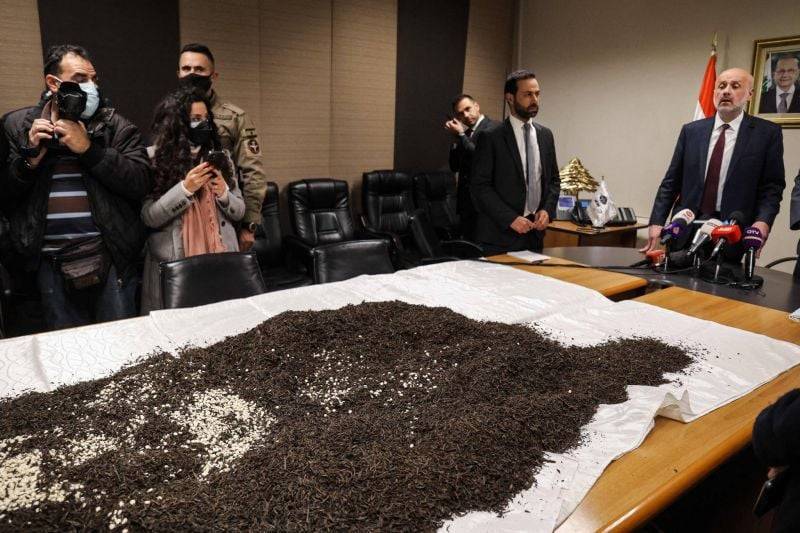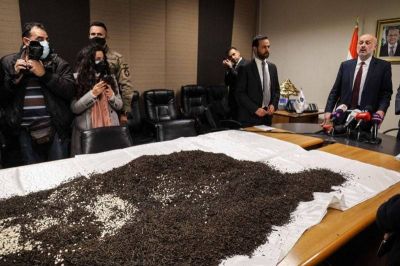
Lebanese Interior Minister Bassam Mawlawi at a press conference announcing the seizure of a shipment of Captagon pills from tea crates bound for Saudi Arabia in Jan. 2022. (Credit: Anwar Amro/AFP)
On Nov. 1, the Lebanese Internal Security Forces (ISF) announced they had seized nearly 5.5 million Captagon pills concealed in construction panels in South Lebanon’s Ghazieh. The narcotics were destined to be smuggled to Sudan via Côte d’Ivoire.
Photographs released by authorities bear the seal of the two interlaced crescents: an explicit reference to the antidepressant drug marketed under the same name before its ban in most countries during the 1980s.
Since then, pills bearing this logo have coexisted with a myriad of rarer representations intended to indicate the quality of the merchandise: swastika, camel, MBS (another wink, this time, to the main consumer market, Saudi Arabia).
While the Ghazieh seizure is the largest since the beginning of the year, it trails far behind the record seizures made in 2015.
In 2015, the authorities first got their hands on five tons of amphetamine powder (equivalent to 30 million pills, after processing) at the Beirut airport. Three months later, they arrested a Saudi prince and four accomplices who were trying to smuggle two tons of powder (equivalent to six million pills) to Riyadh on board the prince’s private jet.
Under Saudi pressure, the Lebanese authorities are making every effort to combat this illicit trade, seeking to lift the ban on Lebanese imports to Saudi Arabia, which was imposed by the kingdom in 2021.
This effort, however, does not appear to be reflected in the figures for the moment. According to data provided by the ISF, about 20.45 million pills were seized in the first ten months of 2022, a decrease of 21.2 percent compared to the same period last year.
These figures, however, should be taken with a grain of salt, given the random nature of the volumes involved. For instance, in December 2021 alone, three operations allowed the Lebanese authorities to recover around 14.4 million pills — a third of the total for that year (see infographic).
But it is certain that the quantities confiscated in Lebanon — 139 million pills since 2017 according to the ISF, which did not release data for previous years — remain far lower than those Saudi Arabia claims to have intercepted from Lebanon, which amounts to 700 million between 2015 and 2022.
Lack of resources
This discrepancy can be explained by the many obstacles faced by Lebanese authorities in their fight against Captagon smuggling.
“Sometimes they don’t even have gas to conduct searches,” Nizar Jurdi, a former customs official, told L’Orient-Le Jour.
This lack of resources not only affects the fight against drugs within the country, but also hinders the ability to control which goods cross the borders.“If the state decided to do so, it could stop the traffic at the borders in an instant. All we need to do is equip and maintain our scanners at all ports and legal crossing points,” Jurdi said, noting that the 30-year-old, faulty scanners at the Beirut port force customs officers to inspect cargo manually.
In July 2021, France provided a mobile container scanner to Lebanese customs, but given the scale of illicit traffic, the machine proved inadequate.
Given the cross-border nature of the traffic, there is another crucial obstacle hindering the work of Lebanese authorities: insufficient cooperation between security forces and their counterparts in neighboring countries.
Khaled Batarfi, a specialist in international relations at the Saudi University of Alfaisal, pointed out that, despite the suspension of Lebanese imports, the channels of communication have not been broken.
“There is cooperation between the two countries in the fight against drugs, but it is probably not enough because we still receive significant quantities from Lebanon,” Batarfi told L’Orient-Le Jour.
But this is not the case with the other neighboring countries.
“We exchange information with many countries within the framework of Interpol, but communications with Syria have been suspended for a long time,” according to an ISF source who spoke on condition of anonymity.
Notably, a finger of blame is often pointed at the Assad clan for its role in the production and smuggling of Captagon.
None of the security sources interviewed for this story could clearly answer whether the authorities had considerable leeway to intervene effectively throughout Syria, including in areas controlled by Damascus’ allies or personalities close to some Lebanese political parties, mainly Hezbollah — designated by many observers as an essential link in the smuggling chain.
Lack of prevention
In this context, the fight against Captagon seems to mainly focus on small traffickers, who have been arrested by the hundreds and face up to three years in prison.
But here, too, the numbers are slowing down since the outbreak of the economic crisis. According to the ISF, 1,994 individuals were arrested in 2021, down from 4,521 in 2017.
“We do not have the means to maintain the same pace in terms of operations as before the crisis,” an ISF member said.
Consumers are also targeted by the authorities.
A 1998 law stipulates that non-repeat offenders can evade penalties provided for in the penal code — ranging from three months to three years for possession or consumption — by agreeing to follow a detoxification program.
But in reality, only a minority of consumers are referred to one of the country’s 10 official rehabilitation centers. The number of patients in rehab centers has however increased in recent years, rising from 40 in 2014 to 462 in 2019, according to the latest statistics.
“This is one of the goals we’ve been hoping to advance for several years,” Rabih Chamai, director of the mental health program at the Health Ministry, told L’Orient-Le Jour.
“We want to change the discourse toward a public health issue, not a judicial one. There is a lot of stigma and suffering and many people fall through the cracks because of the current shortcomings,” he added.
For Chamai, this is due, above all, to a lack of coordination with judicial authorities.
“Some did not even know of the existence [of our department],” Chamai said. “The objective is that prevention is the rule, not the exception.”
In the meantime, despite the ongoing reports of raids and seizures, Captagon trafficking is likely to continue.
“The drug problem is unlikely to be solved until the economic situation improves,” Jeremy Arbid, author of a detailed report on the subject, told L’Orient-Le Jour.
“The state can’t even afford to provide electricity to its people. How do you expect it to fight drugs effectively?” he added.
This article was originally published in French in L'Orient-Le Jour. Translation by Sahar Ghoussoub.
